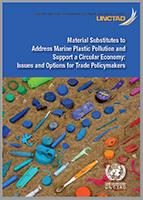
Plastics are ubiquitous in modern life. They are used in a vast diversity of products, ranging from consumer durables such as televisions, toys and clothes, to construction materials, vehicles, clothing and packaging for food and beverages.
However, the negative environmental impact of plastic pollution, especially in the world’s oceans, is widely recognized and acknowledged. To date, the focus of efforts to reduce plastic pollution has been largely on minimizing marine pollution as well as on ‘end of life’ disposal and clean-up solutions. There is, however, growing recognition of the need to focus on upstream part of the plastics life cycle, including measures to reduce production and use of conventional polymers.
Recognizing both the advantages of plastics as well as the negative environmental impacts linked to the production, use and disposal of plastics, two essential questions to ask are:
- Is the use of plastics for a particular application useful, justified and appropriate?
- Is the use of plastic for a particular application useful and convenient, but inappropriate?
This paper explores options that exist to promote plastic substitutes along with the issues, challenges and considerations that policymakers are likely to face, particularly from a trade and sustainable development perspective.
Section II provides a categorization of the plastic substitutes.
Section III explores conceptual and definitional issues, particularly around the concept of biodegradability, and sets out some key criteria that could be used to evaluate the merits and demerits of various types of plastic substitutes.
Section IV provides a preliminary assessment of market and trade-related trends in selected examples of plastic substitutes with an emphasis on natural fibres of export interest to developing countries. Section V examines some of the main tariff and non-tariff measures affecting market access for select plastic substitutes.
Section VI explores what could be some short, medium, and long-term trade policy initiatives that could be pursued to support the scale-up of plastic substitutes, as well as some additional considerations for policymakers as catalysts for trade-led action.
Section VII concludes the discussion with some observations and also identifies a few knowledge gaps that might need to be addressed in future so as to constructively inform policymaking initiatives on plastic substitutes.


